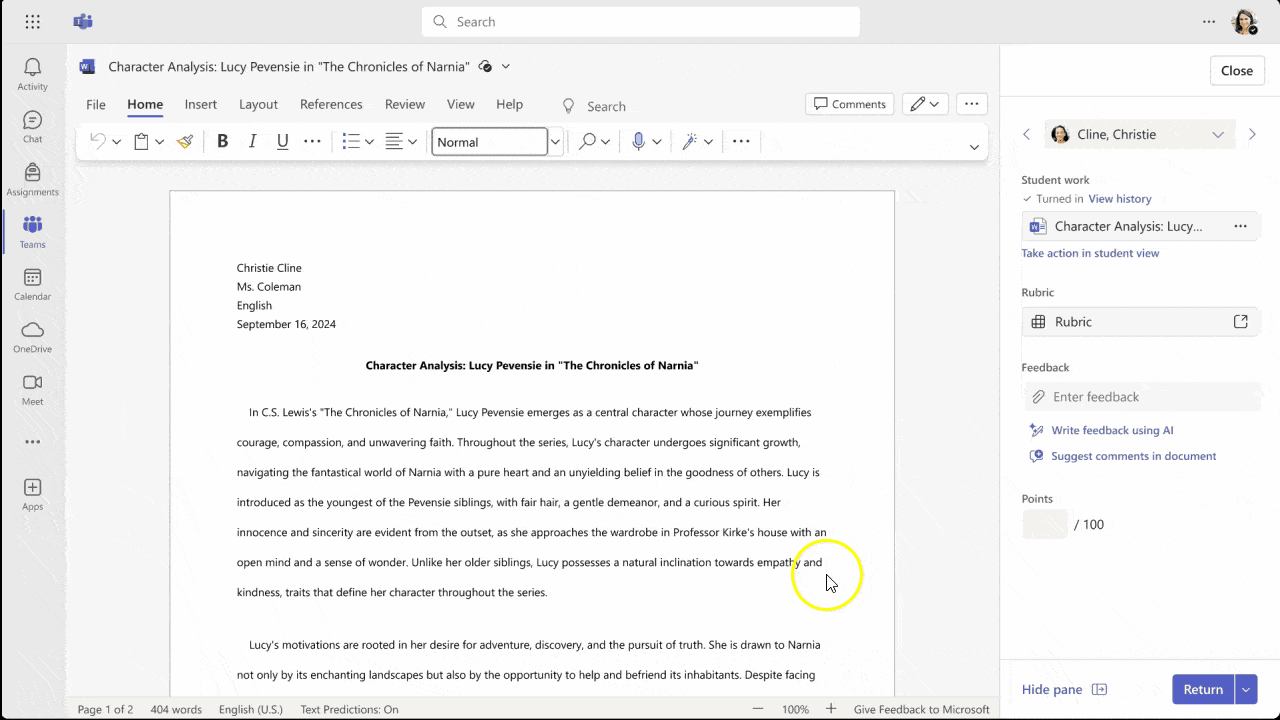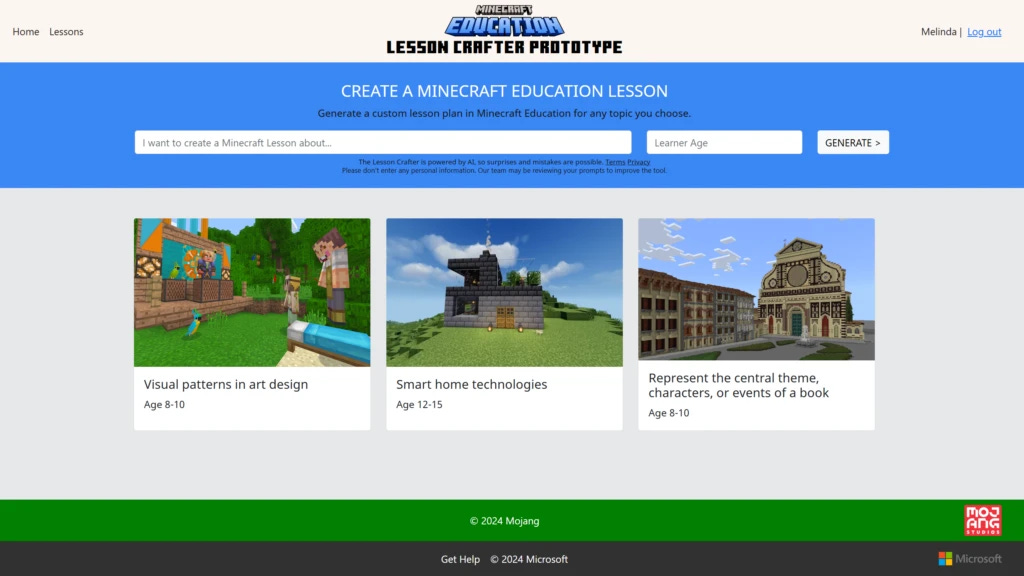🎒Latest AI Innovations in Edtech
ISTE Live 24, one of the nation’s largest educational technology conferences, is spotlighting some of the latest AI innovations in edtech
ISTE Live 24, one of the nation’s largest educational technology conferences, is taking place in Denver this week from June 23-26. The event showcases numerous innovations and updates in the edtech field. Over 200 sessions are dedicated to AI, reflecting its growing importance in education. We are seeing more educators piloting AI tools in classrooms, professional development opportunities focusing on AI literacy for educators, and ongoing discussions about policies to govern AI use in educational settings. How prepared do you feel about AI's impact in the classroom in the upcoming school year?
Here is an overview of today’s newsletter:
New AI features in Microsoft Education
Latest Projects feature update on Claude
Webinar recording of AI x Education First Webinar
Recent paper on integrating generative AI for personalized educational simulations
🚀 Practical AI Usage and Policies
With ISTE Live 24 taking place this week, numerous companies have revealed new product updates. Here are some recent updates coming to Microsoft Education:
A new quiz generation through Copilot in Microsoft Forms will enable teachers to generate quizzes with correct answers, provide detailed step-by-step solutions for each question, and seamlessly distribute these quizzes to students through Teams for Education.
Educators will have access to a guided content-generation experience that streamlines the development of educational materials such as assignments, lesson plans, and presentation slides.

Students and teachers will be able to benefit from AI-generated interactive practice exercises. These can be created and shared by educators or generated by students themselves, helping to save time and enhance retention of subject matter.
An AI-driven feedback system will be available to assist educators in providing personalized comments on student work. Teachers will have the option to review, modify, or remove AI-suggested feedback, which is based on individual student progress, rubric criteria, and assignment guidelines.

Minecraft Education is set to preview its upcoming Lesson Crafter web tool at ISTE. This free resource will allow educators to create customized, easy-to-implement lesson plans for Minecraft Education. These plans can be tailored to any subject, age group, or learning objective, making it simpler for teachers to incorporate engaging, game-based learning experiences into their classrooms.

Anthropic recently released Claude Projects, a new feature for Claude.ai Pro and Team users that offers significant potential for students and educators to enhance the learning experience. For educators, it can act as a platform to organize course materials, lesson plans, and resources in one place, allowing them to leverage Claude's AI capabilities for more efficient lesson planning, assignment creation, and personalized feedback generation. Students can benefit from Projects by creating study spaces tailored to specific subjects or assignments, incorporating relevant textbooks, notes, and research materials. This could help them use Claude more effectively for research assistance, essay writing support, and concept explanations. The collaboration features allow for peer-to-peer learning and teacher-student interaction, enabling shared knowledge and insights.
📣 Student Voices and Use Cases
Our team at AI x Education recently hosted our first webinar, “Illusion of Mastery? How to Teach and Assess Mastery in the Age of AI”, featuring Eric Klopfer, director of the Scheller Teacher Education Program and co-faculty director for J-WEL World Education Lab at MIT, to shares a thought-provoking insight arising from an experiment he conducted with students. Through the discoveries from Klopfer and his students, the webinar explored implications and strategies for integrating AI in CS classrooms, sparking a dialogue on the paradigm shifts needed in curriculum design, teaching methodologies, and assessment frameworks in the age of Gen AI. Check out the recording of the webinar below:
📝 Latest Research in AI + Education
University of Pennsylvania - The Wharton School
AI Agents and Education: Simulated Practice at Scale ↗️
This paper investigates the integration of generative AI to create personalized educational simulations. It introduces a prototype called PitchQuest, a venture capital pitching simulator, to demonstrate AI's potential in providing customized instruction, practice, and feedback. By employing multiple AI agents, these simulations can adapt to individual students' needs, simulating interactions with mentors and evaluators to enhance learning experiences. The technology promises to lower the cost and complexity of developing educational simulations, potentially making immersive, practice-based learning more accessible.
However, the implementation of AI in educational settings is not without challenges. The paper acknowledges issues such as AI's tendency to stray from lesson objectives, introduce biases, and the potential for generating misleading content. Despite these hurdles, the prototype has shown promise in providing dynamic learning environments where students can repeatedly practice and receive immediate feedback. The paper further underscores the importance of rigorous testing and ethical considerations in developing AI-driven educational tools.
Mollick, Ethan R. and Mollick, Lilach and Bach, Natalie and Ciccarelli, LJ and Przystanski, Ben and Ravipinto, Daniel, AI Agents and Education: Simulated Practice at Scale (June 17, 2024). Available at SSRN: https://ssrn.com/abstract=4871171aiEDU
The survey conducted by aiEDU aimed to capture the sentiments of K-12 educators regarding the integration of artificial intelligence (AI) into educational settings. A total of 1,054 K-12 educators, including both teachers and administrators, participated in the survey, reflecting a broad demographic with a majority working in public schools and nearly half possessing advanced degrees. The results revealed a mixture of curiosity and apprehension among educators about using AI, with many not having had the chance to use the technology directly in classrooms. Despite this, there is a strong consensus (over 80%) that professional development for educators should include AI training, and lesson plans should incorporate AI to prepare students for its inevitable role in the future of education.
Educators expressed a range of opinions about generative AI—some see it as a tool for enhancing student engagement and improving instructional methods, while others fear its potential to diminish the role of teachers and encourage cheating. The survey highlighted a general lack of AI literacy among educators, underscored by a division in perceptions between administrators, who are generally more positive about AI’s potential, and teachers, who are more cautious. Overall, the survey indicates a pressing need for more comprehensive training in AI for educators to fully integrate this technology into the curriculum effectively and ethically.
The AI Education Project. (2024). Pulse Survey Report. aiEDU.📰 In the News
CNBC
AI is getting very popular among students and teachers, very quickly ↗️
Key takeaways:
AI adoption in K-12 education is rapidly increasing, with 46% of teachers and 48% of students using ChatGPT weekly. This reflects a significant rise from previous figures, with overall familiarity among teachers growing from 55% to 79% and among students from 37% to 75% within just over a year.
The attitude towards AI in education is predominantly positive: 70% of K-12 students view AI favorably, a sentiment that increases to 75% among undergraduates and stands at 68% among parents.
Despite widespread use and positive views, only 25% of teachers have received training on AI, which suggests a gap in professional development. However, those using AI report significant time savings in preparing educational materials and assessments.
Concerns about AI in education include its potential to facilitate cheating, with students using AI for tasks like writing essays. As AI use continues to expand, schools are exploring new monitoring systems to ensure academic integrity.
Cal Matters
California teachers are using AI to grade papers. Who’s grading the AI? ↗️
Key takeaways:
California schools are increasingly using AI tools like chatbots and automated grading systems across various districts, including San Diego, central California, Los Angeles, and the San Francisco Bay Area, to grade papers and provide feedback, aiding teachers in faster grading and enhanced student feedback.
Despite widespread adoption, there is no uniform guidance or tracking from the California Department of Education on AI use in schools, and the existing state guidance on AI is advisory rather than mandatory, which has led to inconsistent implementation across districts.
Teachers have reported positive outcomes from using AI in classrooms, noting it saves time and allows for more assignments and feedback, enhancing student writing skills. However, concerns remain about the accuracy of AI grading, especially for high-performing or struggling students.
There are ongoing discussions and proposed legislation (Senate Bill 1288) aimed at creating a working group to provide further guidance on safe AI use in education, acknowledging the need for better oversight and understanding of AI's role and impact in the classroom.
“Chatgpt.” ChatGPT, OpenAI (GPT-4), openai.com/chatgpt. Accessed 25 Jun. 2024. And that’s a wrap for this week’s newsletter! If you enjoyed our newsletter and found it helpful, please consider sharing this free resource with your fellow educators!




